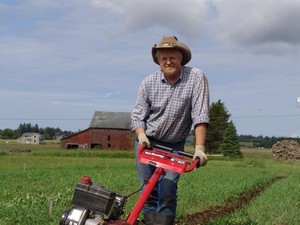02 Jan Sat 2010
Ecological Economics
For the last couple of weeks, I have been blogging back and forth on an energy subject discussion on the Transition Whatcom site. Someone else started the thread and the responses have been quite thought-provoking. If you want to look at the whole discussion, you can go to: http://transitionwhatcom.ning.com/forum/topics/the-economics-of-scarcity?page=1&commentId=2723460%3AComment%3A12383&x=1#2723460Comment12383 Today, I posted a response about Howard Odum, who is a seminal figure in bringing ecological principles to economics. He was a prime influence on Herman Daly, whose ideas on steady-state economics are becoming more and more relevant as mainstream economic ideas continue to swirl around the toilet bowl. Of course, I relate this to my own input/output ideas of measuring sustainable agriculture. Here is the latest post.
The link to Odum has another aspect. Robert Costanza was a Ph.D. student of Odum's at Florida State and did his dissertation on quantifying and modeling energy flows using input/output analysis. Sort of like using a metric (calories) to quantify results in a sustainable model and then comparing fossil fuel agriculture vs. human labor agriculture, isn't it?
Costanza ended up collaborating with Herman Daly for 30 years. Daly's mentor for his Ph.D. at Vanderbilt was Nicolas Georgescu-Roegen, whose specialty was teaching thermodynamics to economists. Costanza and Daly started the International Society for Ecological Economics and the journal Ecological Economics. Thus there is a strong foundation in physics (specifically thermodynamics) underpinning steady-state economics. This contrasts markedly with modern economics and its two base paradigms of 1) the rational human and 2) the efficient market. Let's see - physics paradigms vs. philosophy paradigms. I'll take physics.
Let me suggest a two-step process in using capital. First, there is the creation of capital, such as with farming, extraction of oil, felling timber, etc. The next step is zero-sum economics, where the capital is already in the system and you have to get access to it from someone else. Everyone is familiar with zero-sum - we are slammed with it every day. However, if you want to focus on creation of capital as an alternative that you can actually control, the only capital creation that is sustainable is farming - even then there has been a mainstream pattern in the last 60 years of using extracted resources to grow food. However, if I can keep my inputs lower than my outputs, I create sustainable capital. I can use this for whatever reason I choose, and I have been doing so for political purposes for some time. In other words, we can grow a lot of food - as long as it's sustainable (inputs lower than outputs) - and give or sell this food to people who buy into our political views. Don't get me wrong, this is much more nuanced than you might think. I certainly don't require someone to be a "commie pinko" in order to buy potatoes, nor am I advocating such a childish marketing scheme.
However, since you, the producer of new food capital, are voting with your dollar every day either for the mainstream or for viable alternatives, you can also vote with your newly-created food capital. You can just give your food away to the local Food Bank and you are voting for feeding hungry people without a value judgment. You don't have to say anything to anybody. All you have to do is just give the food away to people who need it. Pretty simple, really. Just grow more food and give it away. There is already a program that advocates growing an extra row of vegetables for the hungry. Let's ramp this up a bit. A revolution is not going to happen in the USA and we have all known that for 40 years. However, it is revolutionary to work every day on something positive to feed people.

